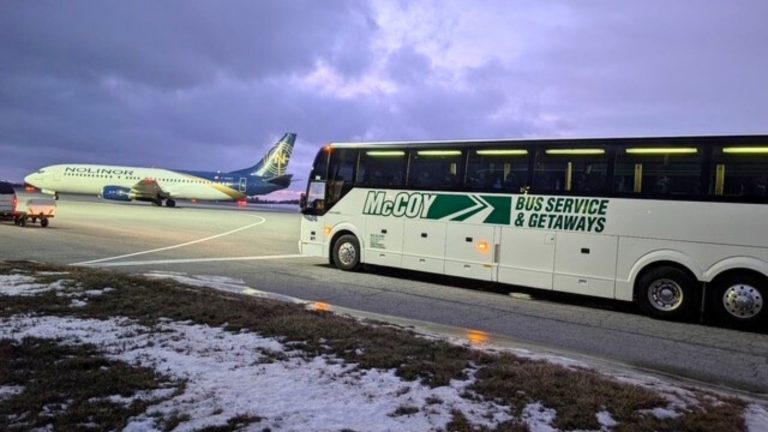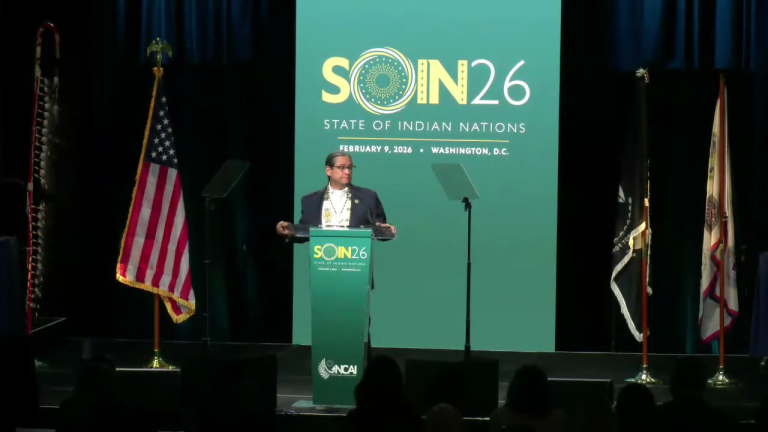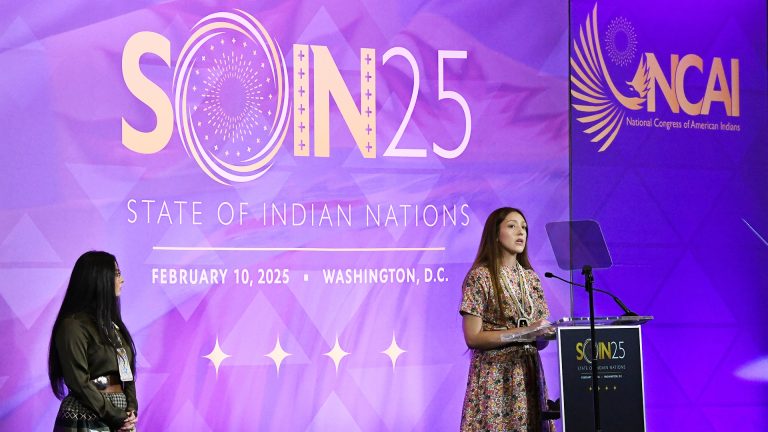Podcast: Play in new window | Download | Embed
 MEGAN KAMERICK: This is National Native News. I’m Megan Kamerick in for Antonia Gonzales. Four more tribes are asking a judge to block restrictive new election laws ahead of the November midterms. It’s part of a larger battle over voter access in Native communities. Bert Johnson with the Mountain West News Bureau reports.
MEGAN KAMERICK: This is National Native News. I’m Megan Kamerick in for Antonia Gonzales. Four more tribes are asking a judge to block restrictive new election laws ahead of the November midterms. It’s part of a larger battle over voter access in Native communities. Bert Johnson with the Mountain West News Bureau reports.
BERT JOHNSON: Montana passed laws to eliminate voter registration on Election Day and limit ballot collection. But tribal governments say that will disproportionately impact Native voters, who often live far from the polls.
Jacqueline De León is with the Native American Rights Fund, which represents the tribes. She says a judge blocked a similar Montana law because it violated the state constitution. And in Nevada, tribes successfully sued to expand voter access on their reservations.
DE LEÓN: We’ll continue to file lawsuits, where Native Americans are being discriminated against, and we’ll either force compliance, or will hopefully spur a change.
JOHNSON: De León is a member of the Isleta Pueblo in New Mexico. She says some legislatures in Western states are trying to make it harder to vote.
A Utah bill aims to end mail balloting. In Arizona, some lawmakers want to get rid of drop boxes. For National Native News, I’m Bert Johnson.
 KAMERICK: A couple has filed a lawsuit in Oklahoma challenging whether the state has the right to tax Native Americans in the wake of a landmark US Supreme Court ruling in 2020.
KAMERICK: A couple has filed a lawsuit in Oklahoma challenging whether the state has the right to tax Native Americans in the wake of a landmark US Supreme Court ruling in 2020.
The Tulsa World reports Harold and Nellie Meashintubby are members of the Choctaw Nation. They’re seeking a decision from a judge on whether the McGirt decision also includes civil matters like taxation.
That decision by the Supreme Court found that the Muscogee Nation reservation had not been disestablished by Congress. That left its boundaries from the 1860s in place and meant the state of Oklahoma did not have jurisdiction to prosecute criminal cases on the reservation if the victim or perpetrator was a tribal member. A state court extended that decision to five other tribes, including the Choctaw Nation.
The couple argues the decision extends to civil tax matters and they also cite prior court decisions that found tribal citizens did not have to pay state taxes when they work and live on the reservation.
A spokesperson for the state tax commission could not comment on the case.
In New Mexico, Gov. Michelle Lujan Grisham signed two bills on Thursday at the Indian Pueblo Cultural Center in Albuquerque to address Missing and Murdered Indigenous Women and Relatives.
Source New Mexico reports the first bill will establish Missing in New Mexico Day, an annual event to bring families together with law enforcement and also connect them with resources in cases involving missing or murdered family members.
The second bill the governor signed into law gives the attorney general’s office authority to prosecute these cases and potentially create greater collaboration among police agencies.
It specifies that the AG must hire one or more missing Indigenous persons specialists.
The law also calls for the attorney general’s office to form a grant program that would distribute up to one million dollars for tribes to develop training and criteria for creating a uniform reporting system for missing persons cases.
The Navajo Nation is recognizing the life and legacy of Dorothy Bitsilly. The 93-year-old agriculture and food sovereignty advocate died Wednesday.
In a written statement Navajo President Jonathan Nez said Bitsilly demonstrated self-reliance, self-determination through her accomplishments and showed compassion for her community of Tohatchi. Nez said her advocacy was an example of what it means to love and serve her community.
In addition to her work for the Red Willow Farm project, Bitsilly served for over 30 years as the Bureau of Indian Affairs education liaison. She was also the vice president of the Fort Defiance Agency Council on Aging, and the Navajo Nation representative to the New Mexico Aging Advisory Council. She is survived by 10 children, 21 grandchildren, 41 great grandchildren, and 4 great-great grandchildren.
Get National Native News delivered to your inbox daily. Sign up for our newsletter today.
Detroit Police officers breaking up a permitted sugarbush ceremony in celebration of #Indigenous food sovereignty leads this month’s regular feature The Menu. Today on Native America Calling, our resident foodie Andi Murphy goes inside the incident with organizer Rosebud Bear-Schneider, an Anishinaabe farmer and food educator. Plus, Lisa Wedin from the Bering Straits Native Corporation on their new “Tundra to Table” #AlaskaNative cookbook; CEO and founder Lucille Contreras from the Texas Tribal Buffalo Project on returning five sacred beasts to Lipan Apache lands; and Chef Nephi Craig from Café Gozhóó in Arizona, which re-opened to offer healing meals for those recovering from substance abuse.








